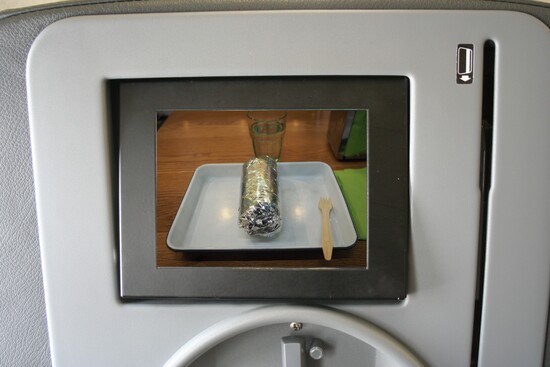Inflight Auctions |
June 29th, 2025 |
| econ, planes |
Imagine you load up your seatback entertainment, and one of the options is a burrito. But there's only one. You can put in a bid, and 1/3 of the way into the flight the person who bids the most gets it. Surely on an airplane of two hundred people there's at least one person with an unusually strong desire for a burrito at 30k feet. And it's not just burritos: other meals, decent headphones, headphone splitters, airplane pillows, diapers, charging cables, cozier blankets, a range of snacks, etc. Anything airlines don't typically provide where there's a high chance that someone might want it.
Part of what makes it hard to provision airplanes is that you're expected to have enough for anyone who might want one. Either you overprovision, or you find yourself apologizing to some people that you're out; neither are great. Auctions allow you to stock a small number of additional things, and sell them to the small number of people who most want them.
Building software and figuring out what to stock seem hard, and not the kind of thing airlines are good at, so let's say this part is a startup. They make a deal with an airline, provide software to run the auction and tell the flight attendants which things to bring to which seats, and provide the things to sell. The quick way to get started acquiring things is just to hire employees who walk around the airport, buying things that the startup has previously seen sell well, but long term for non-perishable products margins would be a lot better bringing them in through the same screening system used for airport vendors. The startup and airline negotiate a 'budget' in weight, space, and total passenger interactions, and they optimize their stocking to make the best use of the budget. The airline gets some form of payment, which would be somewhere between a fixed fee (to reduce risk to the airline if the startup is bad at judging passenger desire) and a percentage (to align incentives).
I think the biggest problem is that while in an important sense this would be better than the status quo, since worst case you buy nothing and best case you win an auction and so get something you prefer to the money, in practice I expect passengers would absolutely hate it. The benefit generally goes to people with more money, the onboard monopoly means that the seller captures most of value, it reduces the incentive for the airline to provide things people want through the traditional system, and even the auction winners will often find they overpaid. Still, maybe there's something here?
Comment via: facebook, lesswrong, mastodon, bluesky, substack
